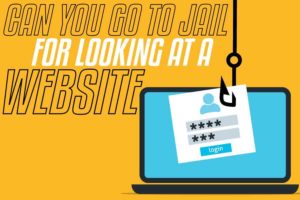
You’re on the Internet. So are millions of other people, including potential jurors, in your trial. What you do online is not private, and even searching for legal terms could get you in trouble.
Imagine being charged with a crime because someone Googled “murder,” and your name was one of the results.
To avoid a prison sentence, we must be aware and cautious of anything that can be used against us when we are caught up in an Internet search.
This article discusses the different illegal searches and websites that could land you in trouble.
Can You Go To Jail For Looking At A Website?
Yes, you can be prosecuted for visiting illegal websites. It may not be instantly, but you will be investigated and charged if a case comes up. Some searches will immediately get flagged by the FBI, such as Child Pornography and Bomb and explosive related searches.
Who Can Be Held Liable For Viewing A Website?
There are many reasons why people visit illegal websites. There are different types of illegal sites. Some sell copyrighted content, some host pirated material, and some contain child pornography.
When you use the internet, you connect to a server and send information. Sometimes the site you visit is legal; other times, it isn’t. When you connect to an illegal site, you can get into trouble for three different reasons:
- The site can be illegal in your country.
- You can be committing a crime by downloading illegal material.
- You could also be committing a crime if you are accessing illegal stuff such as child pornography and bomb assembling information.
What Happens If You Visit An Illegal Website?
Your computer or the device you’re using might have been altered without your knowledge so that the site could be dangerous for you.
Potential Exposure To Viruses
Visiting an illegal website can be very harmful. You do not know the kind of viruses you are downloading or else.
When it comes to the internet, nothing is free: that means no free movies, no free music, and no pirated software.
The websites you surf to may look harmless, but they can be a gateway to viruses, malware, and more serious cyber threats.
The more popular and frequently visited an illegal website is, the higher the risk of encountering dangerous content.
These sites are often linked to organized crime rings that use their popularity as a way of luring victims into unknowingly downloading malicious files on their computers.
Your computer will become infected with a virus or malware, which could damage your computer’s hardware or software.
Accessing The Dark Web
The Dark Web has become a haven for illicit activities and attracts criminals from all over the world. It is used by cybercriminals, who use it to communicate in relative anonymity.
Speaking With A Child Predator Online
Child predators often use online forums to contact children. They create fake profiles and pretend to be someone their victim can trust.
Once they win them over, they can arrange meetups which could result in rape and kidnapping.
Is It Illegal To Access And Browse The Dark Web?
The Dark Web is a network of hidden websites that use special software to make them inaccessible to normal search engines.
It’s estimated that there are over 100,000 remote sites on the Dark Web and about 20% of them are marketplaces selling drugs, guns, counterfeit goods, or stolen credit card information.
There is a very thin line between accessing the dark web to do research and using the dark web for illicit activities. Many people have a vague understanding of the dark web and how they can get there.
When you search for a website online, your request goes through a centralized server. The domain name system (DNS) translates your request so that the server understands what you are seeking.
The dark web is a collection of sites requiring special browsers, configurations, and anonymity tools to hide their identity.
Some of these sites are utilized by law enforcement agencies, while others are used by criminals to plan crimes and make illegal purchases.
The good news is it is not illegal to access the dark web. The bad news is that many of the sites on the dark web are used for criminal activity, so accessing them could land you in hot water if you aren’t careful.
The dark web is a level of the internet that isn’t accessible using standard browsers. The only way to access it is through a special browser, like Tor.
This can be used for good and bad purposes, but it also means that accessing the content on the dark web has been illegal since its inception.
The dark web is home to a massive amount of illegal content, such as pornography, human trafficking, drugs, stolen data, and more.
Because this data is illegal, browsing the dark web can have serious consequences on your life.
It’s not just criminal organizations like the FBI interested in your searches but also the FDA and Interpol.
Illegal Internet Searches That Could Get You Arrested
However, some illegal searches could get you in a lot of trouble if you get caught doing them.
There are several ways to search the internet that can get you in big trouble. This is because many people look for ways to access copyrighted material or other content that is illegal in their country.
The first example is searching for ways to make bombs or other weapons on the internet. That’s a federal offense and will result in your arrest.
The same goes for finding out how to hack into a government database or website. These are all offenses that could land you in prison. While getting caught isn’t likely, it can still happen and can have serious consequences if it does.
Others include;
- Child pornography
- Fake autographs
- Photos of people’s families being used as porn
- Explosives; assembling and composition
- Drug-related searches
- Different ways of homicide
- Methods of ending human life
How To Know If A Website Is Illegal
Whenever you plan to spread any content across the internet, you want to make sure you have legal documents to back up your claims.
If a website looks illegal or doesn’t have the proper documentation, do not share its content. It could get you in trouble with the government, and it could even get the site in trouble too.
There are a lot of illegal websites online. There are even more that are borderline illegal.
- For example, the website may be a phishing site designed to steal credit card information. Other illegal websites may be designed to trick users into downloading adware or spyware.
- First, attempt to visit the site. If you get an error message saying that the site is not available at the moment, this is a good sign that something is not right. You can also check for illegal content by visiting the legit website checker and finding out who owns the domain name.
You can’t always know whether a website is legal or not just by looking at it. There are blatantly illegal websites; however, you won’t be able to tell until you investigate further.
It’s up to you to know what you can and cannot do with a website and protect yourself from liability issues related to the internet.
It’s not always an easy task to determine whether or not a website is illegal, and it’s certainly not always clear.
Of course, the safest approach is never to visit a website that you suspect might be illegal, but what if you are curious? What if you want to find out for yourself?
The truth is that many perfectly legal websites may often look suspicious. That’s just because they’re doing something new and different.
Hackers used to hack websites only for their selfish gains in the past. Nowadays, they sell access to their hacked websites on the Dark Web or use them as phishing sites to steal people’s personal information.
Whether it is an email you get from someone you don’t know or a post on a forum from someone you don’t recognize, there are ways to tell if that website is safe.
You won’t always determine whether or not a site is illegal just by looking at it. However, certain red flags should raise your suspicions and get you investigating further. Some of the red flags include:
- The site is selling counterfeit products.
- A site that offers downloads for free
- A site that does not have an HTTPS
- The site asks for your personal information
- The site asks for your financial information, i.e., your card number and CVV
- The site is not secure and does not have the lock on the URL
Conclusion
While there are no official statistics on the number of Americans who have been jailed for looking at a website, it’s clear that this is a very real possibility.
It’s important to be aware of what you’re doing online, and what you can get in trouble for so you can avoid running into legal trouble.








